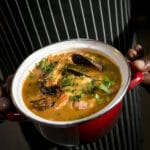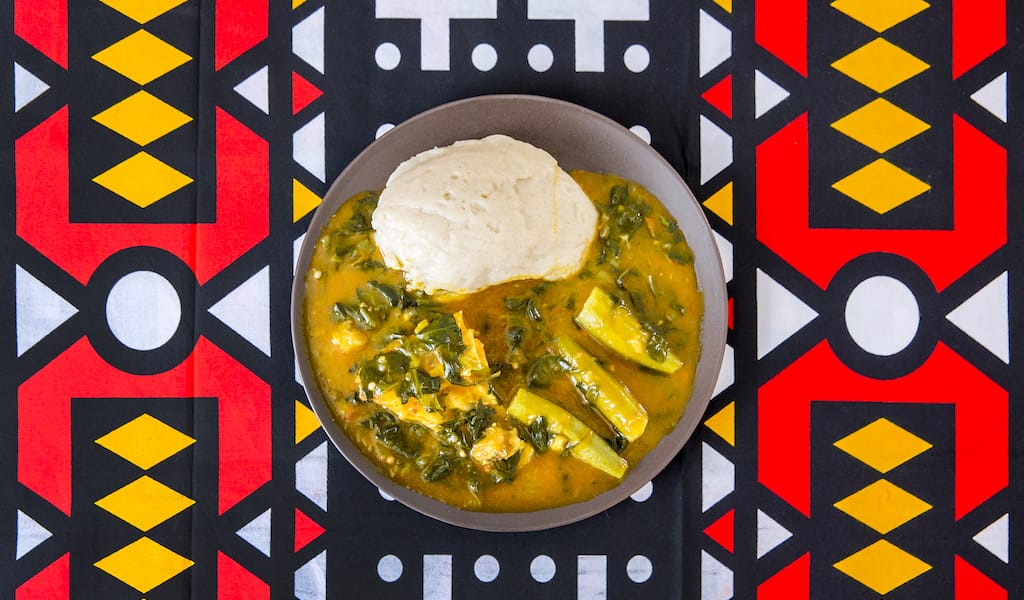As we shoot dishes in Criolense Kitchen Club, drawing attention as photography often does, we get the distinct impression that locals passing by are noticing the space for the first time.
It’s possible they hadn’t noticed this bar/restaurant in Lisbon’s Graça neighborhood because, well, it has no sign. Criolense Kitchen Club shares space with art gallery Hangar, which both outside and in boasts the kind of muted, ship-gray tones and industrial elements one might associate with an edgy art space or perhaps even a workshop. There’s the approximate infrastructure of a restaurant, but the vibe feels more like a private party. It’s the kind of place that inspires the thought, “What, exactly, is going on in there?”

“It started as an experiment after the pandemic,” says Rei Annunciação, one of three people behind Criolense Kitchen Club. He tells us that the trio did catering, events, parties and pop-ups, displaying the flexibility of many businesses during the pandemic era. They served dishes and drinks from the trio’s native Brazil, but as the name hints, ideas of culture and identity seem to have just as much weight as the food.

“In Brazil, crioulo can have a negative meaning,” says Rei, explaining the term, which is used to describe people or culture of African origin. “We wanted to take this word back.”
Another descriptor used by the trio is “black power kitchen,” yet Rei tells us that this concept of empowerment extends to just about any marginalized group: “The idea is that people who have been discriminated against for race or sexuality can feel safe here.”
With these ideas in mind, the team found a space and got to work.
“Before, there were restaurants [in Lisbon] serving Brazilian food, but nobody was selling small dishes, drinking snacks,” Rei tells us. “In Brazil, we love to drink a glass of beer and have something to snack on.”
“Something to snack on,” in the case of the Criolense Kitchen Club, seems to have a specific meaning.

“Here in Portugal we had trouble finding hot, crispy deep-fried dishes,” says Ana Augusta Passos, the second member of the team. So, she explains, they dug into the rich culture of oil-fried snacks back home in Brazil. On the day we visited Criolense Kitchen Club, five of the seven menu items were deep-fried, and included kibé, football-shaped patties of minced beef and bulgur wheat, a dish originally introduced to Brazil by Middle Eastern immigrants; polenta frita, crispy, golden giant French fry-like batons of cornmeal and cheese; and our favorite, dadinho tapioca, cubes of cassava starch, cheese and milk that are glassy on the outside and molten inside, served with a sweet-and-spicy dip. As all these dishes are fried to order, they exit the kitchen piping hot, and are consistently crispy and distinctly non-oily – easily some of the best fried snacks in Lisbon.

“The recipes come from our experiences, from typical dishes from Brazil, from stuff we ate growing up,” explains Tais Vieira, the third member of the team, who along with Rei can typically be found in the kitchen.

There are also deliberate shifts away from the deep-fryer such as freshona, Tais’s take on a Thai dish, a vibrant, colorful salad that combines shrimp, herbs, green mango and coconut. And the menu also generally features a more substantial one-plate dish such as arrumadinho, salted beef paired with chunks of fried cassava, toasted cassava flour and a refreshing cilantro salad.
Salty, crispy fried snacks practically demand drinks, and the team do classic Brazilian cocktails such as the caipirinha (cachaça, sugar and lime juice) and the rabo de galo (cachaça, vermouth, Cynar and lime juice) as well as fun, predominantly fruity in-house creations such as the Golden Shower (white wine, white vermouth, fruit and tonic) and the Porn Star (vodka, passionfuit and vanilla).
After a few visits, several plates of crispy snacks, and a chat with the trio, we thought Criolense Kitchen Club could sorta, kinda be defined: a socially-conscious bar that serves great snacks.
“We still haven’t decided if it will be a permanent place or not,” says Ana, seemingly deflecting our efforts at pinning the trio down – perhaps a recipe for success, these days.
Austin BushAustin Bush
Published on August 24, 2023
Related stories
June 28, 2022
LisbonEditor’s Note: Though integral elements of Lisbon life, communities from Portugal’s former colonies can sometimes be an invisible presence in their adopted land, pushed out to the periphery. With our “Postcolonial Lisbon” series, CB hopes to bring these communities back into the center, looking at their cuisine, history and cultural life. In this installment, we dive…
June 28, 2022
LisbonEditor’s Note: Though integral elements of Lisbon life, communities from Portugal’s former colonies can sometimes be an invisible presence in their adopted land, pushed out to the periphery. With our “Post-Colonial Lisbon” series, CB hopes to bring these communities back into the center, looking at their cuisine, history and cultural life. In this installment, we…
June 27, 2022
LisbonQuick Bite: On this full-day tour of central Lisbon, we’ll study the cuisines, history and diversity of Portugal’s former colonies. Get a taste of Cape Verdean cachupa, Brazilian pastries, Goan samosa, layered convent cake bedecked with spices and Angolan piripiri sauce and meet the people in the kitchen keeping the traditions of these communities alive.…






















































































